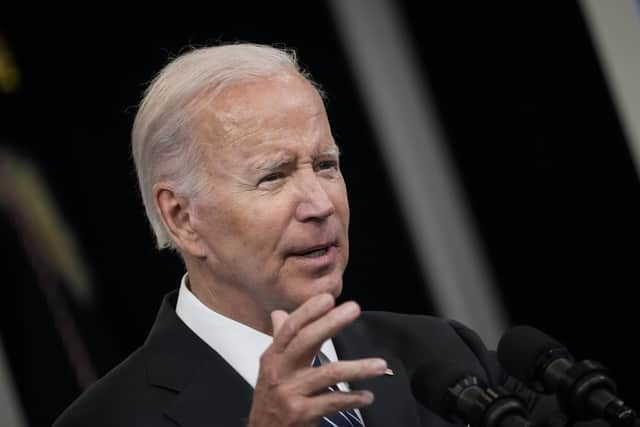What do the US mid-term elections mean for the conflict in Ukraine? - Patrick Mercer
Now, put simply, Democrats hold both houses of Congress by very slim margins and should voters slide towards the Republicans, President Biden will be emasculated for the rest of his first term with any second term in grave jeopardy.
With inflation and the economy dominating voters’ thoughts, there’s bound to be a backlash against the billions of dollars sent to Ukraine.
Advertisement
Hide AdAdvertisement
Hide AdIndeed, there is already discontent in President Biden’s own camp about the continuation of this costly war whilst many Republicans are dead against it.


This puts President Zelensky in a bind. His country has absorbed big bucks in the shape of weaponry and straight subsidies on the condition, it seems, that he continues fighting Russia.
Don’t forget, it’s now apparent that Ukraine was ready to negotiate a ceasefire over six months ago until Boris Johnson came as an emissary from Washington and insisted that they fought on.
Well, with that insistence underwritten by dollar bills, Kiev had to show some positive results, hence their counter offensives which are having some success around Kherson, have made notable gains beyond Kharkov, yet failed bloodily in Zaporizhzhia.
Advertisement
Hide AdAdvertisement
Hide AdThose ground assaults, though, provoked massive retaliation in the air, against which Ukraine seemed powerless with the result that about 30 per cent of the country’s power facilities have been destroyed.
So, with only a few days to go before the US elections, Kiev’s troops are battling gamely. Much of her population is without light, power and water, though, just as winter starts whilst the mobility of military reserves has been crippled by a lack of electricity for its locomotives.
Will this be enough to rally the US electorate or will they be more interested in the price of a gallon of gas rather than a seized village of which they’ve never heard?
But this is one sided, for President Biden’s destiny also puts Russia in a bind. No matter which side storms, sinks or bombards what, Ukraine always triumphs with the Western media - and that’s every bit as legitimate a tool of war as bombs and bullets, especially in the information age.
Advertisement
Hide AdAdvertisement
Hide AdInvariably, Russia’s successes have been written as failures, her advances as retreats and if the current battle is for the minds of US voters, Moscow looks set to lose.
That’s why the frontlines have gone quiet, despite Russia’s 300,000 fresh troops - and that’s why she’s presented her bombardment of cities and infrastructure as simply an imitation of NATO’s Shock and Awe in Iraq, a comparison which Washington would rather forget.
On no account can Russia afford another accusation of atrocities: nothing can happen to harden President Biden’s supporters.
There hangs one huge question, though. Will President Putin’s regrouped forces - remember, we haven’t yet seen her Regular army properly in action - actually fight? Will the new General Surovikin - Armageddon to his pals - be able to conquer or will we see a repeat of the debacle around Kiev last March?
Advertisement
Hide AdAdvertisement
Hide AdBut where’s Britain in all this? Well, we’ve seen both Ms Truss and Mr Sunak reaffirm Mr Johnson’s stance at the same time as some intriguing accusations emerged.
Russian intelligence has long pointed at direct British involvement in the conflict, especially in the offensives in the south where naval and amphibious operations abound.
Then came the curious incident in late September when the Nord Stream gas pipelines were attacked.
Let’s be clear, these are largely Russian owned, but NATO countries, most importantly Germany, have a deep interest in the crucial gas that they transport: without such supplies Herr Scholtz’s people are in for a very cold and dark winter compounded by the collapse of her industry and all the financial problems that will bring.
Advertisement
Hide AdAdvertisement
Hide AdNow, there’s been any amount of obfuscation, but there are suggestions that Ms Truss texted Anthony Blinken - the hawkish US Secretary of State - within minutes of the explosions telling him ‘It’s done’. All this, mark you, on her personal mobile with no encryption and no ‘Danny Boy calling Broadsword’ stuff.
Unsurprisingly, it’s certain that Russia hacks its enemies’ communications and if this is true it points to a dog like obedience from Britain to the US. Now, I accept that Ukraine had long demanded that dependence on Russian gas by Europe should be stopped, but war’s not that simple: can it really be that Britain attacked her allies’ lifeline?
Fascinatingly, Britain’s also getting the blame for the drone attack on the Crimea last Saturday which caused little damage but spurred Russia to suspend the Black Sea “grain corridor”.
Whilst not a simple, military victory, Russia’s reaction is just the sort of thing which the Biden camp can seize upon as polling day approaches.
Advertisement
Hide AdAdvertisement
Hide AdNow, playing a powerful second fiddle to the US’s support for Kiev is right and proper so long as that overarching support doesn’t waver. If it does, though, where does that leave Britain?
If the polls go sour for Joe Biden and money destined for Kiev suddenly has to be diverted Stateside what will happen? Well, look no further than Afghanistan last year when Uncle Sam suddenly bolted without a backward glance at Britannia.
Patrick Mercer is a former MP for Newark and Army colonel.